#skewered noh mask
Text
The /mmeaizreo.html crew

#THIS PAGE -I SWEAR- MADE ME VIOLENT#but not as much as that damn clicking bossfight against the little japanese doll.#lomando#lomando.com#kubishime onna#obii kubi#j-ker#skewered noh mask#funnily enough#I like all 3 of the “screamers” in the page (by character I mean)#all so silly#so joyous#(THEY'RE ALL DEEEEAAAAAD)#banging art :3
23 notes
·
View notes
Text

Yatai Stalls:Japanese Street Food :- Street food vendors are known as Yatai in Japan and while they can be seen in abundance at festivals.
The text written in those colorful nobari :
串だんご (Kushi-dango)
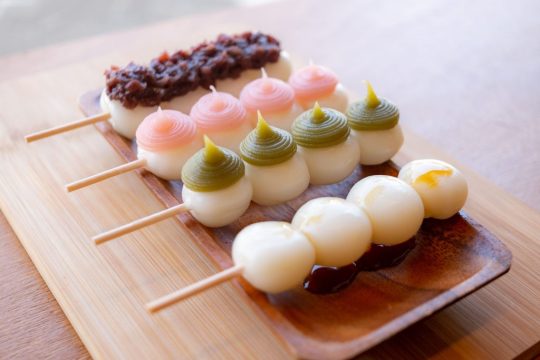
Dango is a Japanese sweet that has been loved by Japanese people for a long time. Dango is a dough made by adding water to powdered grains such as rice, rolling it up and steaming it. Currently, skewered dumplings are often recognized as so-called dumplings, but there are also dumplings that are not skewered. Dumplings flavored with soy sauce, miso, and soybean flour have long been popular among Japanese people. There are also dango called hanami dango and tsukimi dango, which are often seen at events and are said to bring good luck.
たこ焼 (Takoyaki)
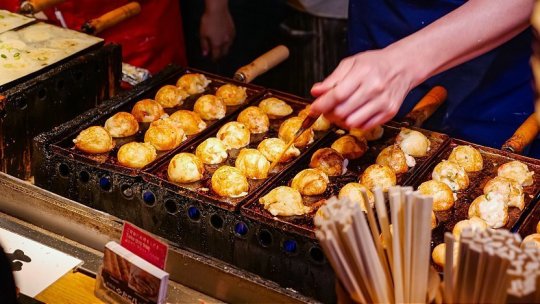
Diced octopus encased in a light batter and rolled into a ball with spring onion and ginger and topped with green seaweed, sauce, sliced and dried bonito, and sometimes drizzled with mayonnaise. The exterior of a takoyaki ball is a nice golden brown while the interior can be a touch molten. A single order of takoyaki typically contains about eight balls that are topped with shaved bonito flakes (katsuobushi), aonori seaweed flakes and drizzled with mayonnaise and takoyaki sauce.
おでん (Oden)
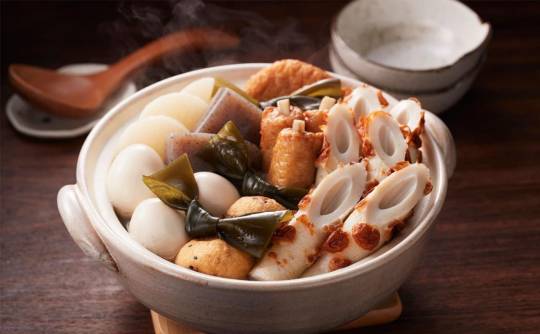
"Oden" is very popular winter dish all over Japan, and each region has original taste, as Ozouni new year soup. Various kind of ingredients slowly simmered in flavorful dashi broth.
• Masks
Traditional Japanese masks (お面) are mostly decorative and can easily be found at festivals and shrine events. Masks have long played an important role in Japanese culture. Most of these masks are archetypes borrowed from mythology, ancient dances, or noh theater and military costume. Traditional masks are still used by theater actors or Shinto dancers. The most popular Japanese masks are often inspired by yokai; Supernatural Japanese creatures that appear in popular legends and beliefs. In Kabuki theater, they used makeup to embody characters such as demons or to translate expressions such as anger, feelings of sadness or rage on the faces. The Kabuki actors, as opposed to the Noh Theater, do not wear masks. The mask has also the function of hiding any individual traces of the actor. The fox mask is worn on the faces of many festival goers during Shinto ceremonies. Kitsune mask always using White colour based with red patterns. Inari Shrine had red colors everywhere included on the fox statues of the shrine. Most of the foxes serve Inari has white fur. In most of Japanese festival, Kitsune mask always using White colour based with red patterns. The mask of the fox used in Noh play or Kagura play is white. Kitsunes are believed to have from one to nine tails. The number of tails a kitsune has indicates its age and strength. Kitsunes can come in different colors but turn white or gold upon gaining their 9th tail. The Nine Tailed Fox, or Kyuubi no Kitsune, can hear and see everything that goes on around the world. They wear these (kitsune) masks, in order to attract good benefits and thus ensure a good harvest.
Here are the masks I identified from the panel above.
1. Ramenman in Kinnikuman series

The Japanese manga series Kinnikuman was written and illustrated by Yoshinori Nakai and Takashi Shimada, known as Yudetamago. The series follow Kinnikuman, a superhero who must win a wrestling tournament to retain the title of prince of Planet Kinniku. The manga was first published in Shueisha's magazine Weekly Shōnen Jump as a two one-shots in December 1978 and March 1979. The regular serialization started with the publication of the first chapter in the May 28, 1979 issue of Weekly Shōnen Jump, where it was serialized weekly until its conclusion in March 1987. Tatakae!! Ramenman is an alternate-universe and spin-off series to Yudetamago's previous work: Kinnikuman. It is focused around the character of Ramenman, who travels the land to fight various enemies. It was serialized in Shueisha's Fresh Jump magazine from 1982 until 1988.
2. Kamen Rider (1971 TV series)

Kamen Rider is a tokusatsu franchise created by manga creator Shotaro Ishinomori.
3. Chiaotzu in Dragon Ball
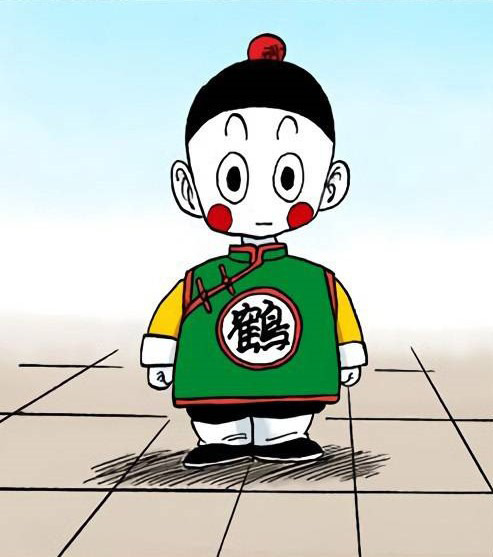
4. Sun Wukong

(The picture I'm using from Toriyama's bonus illustration featured in Dragon Ball's 6th volume)
In the novel, this headgear is something that binds sun wukong. Originally, he didn't wear it, but after following Tang Sanzang, that is, his master. At the beginning, he liked to kill some ordinary people without any spells. Tang Sanzang felt that his character was very bad, so there was a god, she called Guanshiyin Bodhisattva.This Bodhisattva also taught Tang Sanzang a formula. She used the temptation to make Monkey King wear a hat, and then the hat became this headgear, if Monkey King wanted to kill ordinary people.Tang Sanzang can recite formulas, and this headdress will shrink, giving Monkey King a headache and unable to use any spells. @dob-siki thank you for the information!!!
5. Hyottoko mask
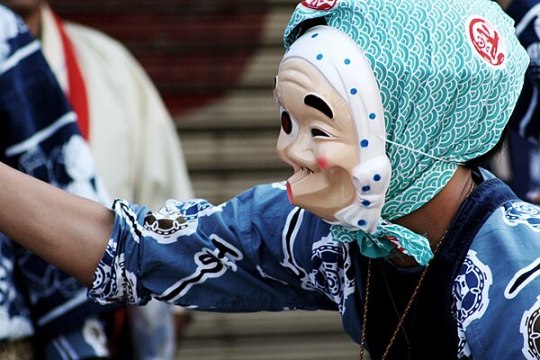
Hyottoko means this facial expression or a mask with this funny face. It's a man. The pouting bent expression of his mouth is very significant. The size of the left and right eyes can be different too. In the mask or the person, who wears the mask often puts Japanese cotton towel (Tenugui) around the head. This character originally came from ancient traditional Japanese dance called Bugaku. The face of this character is an old man playing a funny and ridiculous role. He saw a beautiful couple dancing beautifully and admired and appreciated their dancing while drinking a lot of sake. He was very impressed and tried to dance like that with his wife. But they were too drunk and too old to dance gracefully, so their "dance" turned out to be very funny and awkward. There are many different stories about Hyotoko in Japan. The name Hyottoko came from Hi-Otoko (fire man). He is blowing air through a hollow bamboo stick to make fire. And his expression is showing how hard he is trying. His mouth is also known to resemble sake bottle. Hyottoko masks are commonly used during traditional Japanese dances in order to bring good luck.
I don't know whether the following findings are correct or wrong.
6. Lokai in Star Trek : Let That Be Your Last Battlefield (1969)
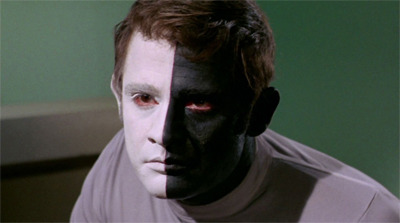
This is what came to my mind when I saw white on the right side and black on the left side.
#naruto analysis#from the drafts#the glass one looks familiar but can't remember where it was seen#my stuff
26 notes
·
View notes
Text
The Jailhouse
(A short, unfinished piece to something from a while back. Historical, 17th century Japan.)
The close seating and lacquered partition screen didn’t hide the gossiping lips in the theatre. It was a dim, almost dungeon-like place, encapsulated in broad strokes of light. It did everything for the Noh dancers of stage, intricately performing in their thick painted masks and bamboo robes, high-lighting their striking features of careful movements. For the people in the theatre, it was a perfect hiding spot. Mouths could move while yellowed eyes couldn’t see and point fingers.
Kaiba inhaled and focused between the dancers. They circled one another and sang while the the orchestra lightly tapped drums in the background.
Someone hustled in and sat beside him. Isono, his personal attendant, he surmised by the quick yet almost silent footsteps. Were he not clothed neatly in silk for the night out, Kaiba would never have known. “My apologies for interrupting, Kaiba-sama.”
“If you really meant your apologies you wouldn’t interrupt.”
“Of course, sir,” Isono replied. His forehead touched the ground. “There is news from Genkū village.”
“I’m watching a play. Have the Lord deal with it.”
Isono wriggled forward. “He’s been called away. His retainers thought it best if you dealt with the situation in his place,” the man whispered, and from the corner of his eye, Kaiba noted that Isono checked their surroundings. With him at the play were two nameless, sinewy samurai from the Lord’s castle. Guards for the Lord’s son. Not that Kaiba thought he needed it. The katana and wakizashi on his hip were enough to protect him, especially from his father’s gangly goons.
“And why is that?” he said, unfurling a fan from his waist. He waved it quickly, making enough noise so that his words weren’t heard.
Isono leaned by his ear. “A half-bred man. The villagers turned him in after a brawl at the inn. They said he was touting the teaching of Christ.”
Pinching his lips, Kaiba bowed his head. “Stay here,” he told the goons as he stood, “I’m relieving myself. Isono can handle it.”
The pair remained unmoved and Kaiba slipped out of the theatre, still hearing the whispers on the crowds.
He always heard something about the Christians anymore, particularly in the towns controlled by the Kaiba clan and it’s subsidiaries. He knew the crowd’s eyes were on him as he left the theatre, and he wondered what they wondered. If they thought he was going to skewer another man, turn him upside down and drain him of blood as his father, the Lord Gozaburo, had done. He knew his father to be a cruel man. He’d faced his hand before, and still, and knew that what he received was the half the sentence of those the Lord looked down upon. Grinding his foot into his son’s head meant nothing to the shogūn, but the heads of the radicals, the foreigners, the thieves in the night who held their conclaves in hovels and abandoned temples? They were everything. They would build Gozaburo a staircase to Edo castle.
Isono told him everything on a short carriage ride back to the manor.
A man, a half-breed, had been staying at the Genkū inn for three days. He already owed them three ryō for all his drinking, eating, and bathing. He offered the old innkeeper nothing but a purse containing a handmade cross and a promise of payment by the end of the week, so long as they let him stay. “The innkeep didn’t say no. Not during this blistering winter,” Isono said, before handing over the purse for Kaiba to inspect. He continued to explain that during a round of drinking, the half-bred man got into heated conversation with travellers from Nagasaki, though the details were unclear. It seemed to involve something about a missionary, and that before the local guard came to break them up, the half-bred man was shouting Bible verses at the traveller and spitting blood in his face.
“He seemed to be a proficient fighter,” Isono added. “Or so the patrons mentioned.”
“I’ll decide that on what his face looks like.” Kaiba examined the patchwork purse and the contents inside. A token, barely a cross. Instead, two welded together metal pieces that looked more like a hooked cross with its edges rounded out. A manji, laid atop another floral design that had been worn from years of touching and wear. A mon. A house symbol he didn’t recognise. Beyond that we’re scraps of rolled up parchment with sloppy, uneven brushstrokes. None were characters he was familiar with, nor were they western. Gibberish. “What other articles were on him?”
“The clothes on his back. He also had a short sword.”
“And his room?”
Isono shook his head. “They’re still looking.”
Tucking the purse into his sleeve, Kaiba stepped out of the carriage and went through the heavy doors that led to the small jailhouse and, subsequently, the dungeon basement at the far end of the castle. Any prisoner entering from the backside would have been dragged through manure and hog pens first. The smell, even from the front entrance, was nauseating.
Inside, the place reeked of mould and still water. The closer Kaiba was to the cells, the stronger hog shit was, which he realised was because the only windows the prisoners had faced the manure fields. Though the antechamber, where the warden and his men sat, was warmed by a large and well-kept brazier, the back halls were moist. Icicles hung from the ceiling, and snow was packed in the corners despite the last snowfall being a fortnight before.
The warden’s attendants showed him to the cell and put a wood stool in front of it.
“These conditions are terrible, we can’t see a thing in here,” Isono muttered. “Bring a lantern so we can actually tell what sort of trouble you’ve dragged Kaiba-dono in here for.”
The attendants scurried away, but Kaiba hardly noticed their existence, or Isono’s complaints for that matter. He buried himself in the moment. The thin, dark hall full of cells was mostly quiet. Barely a breath around them, as if every prisoner held it in reverence. Or fear.
“Light’s gonna do you no good,” a low voice rumbled.
The man in the cell leaned forward, awkwardly supporting himself on a wall. Or rather, the edge of a cangue fitted around his neck. It was fashioned wide enough that his arms, shackled in even holes beside his head, wouldn’t be able to reach his mouth. A torture meant to make the prisoner indebted to his captor and beg for meals. That was, if the warden’s men were kind enough to oblige.
Kaiba’s hand folded into his sleeves. “And why wouldn’t it do any good?”
“Nothin’ to see.”
The man spoke so plainly. There was little subtlety in his voice, other than a waiver of self-confidence. “You’re from where?”
“Dejima.”
“Dejima,” Kaiba repeated. “Like the Dutchman and the foreigners?”
“Somethin’ like that. But I’m no foreigner.”
In the low moon rays, he saw the glimpses what made the man half-bred. Straw-yellow hair, dyed off-brown with dirt and mud to stringy, coagulated patches. Not dark enough to hide him from anyone for long, even less when it had been half-scrapped away in a brawl. But despite his plain-spokenness, he was flawless in his Japanese, with a roll of the tongue common to Kyoto. Someone familiar.
Kaiba curled his lip. “Do you have travel papers?”
“Lost them.”
“In the brawl?”
Something akin to a shrug, shuddering the cangue where it had been hastily put together. The prisoner lifted his head and sighed. “I dunno where they went. I’ve been walkin’ for days now, and I finally came to this little place and figured it was a good place to rest. Didn’t realise it was a crime to do that.”
“It is to get drunk and brawl in public, you half-wit,” Kaiba sneered.
The lantern was brought in and hung front the cell door. In the flickering light, the man’s amber eyes glistened. Moist and round. Too round to be full-blooded, but the gentle slope of his bruised and blooded jaw was a different story. He look like two people in one. Otherworldly and strange in the way the other missionaries and traders and travellers weren’t. Despite the blood painting his lips and nose, he looked well and happy. A smile on his face.
“Tell me your name.”
The yellow-haired man looked down at his hands. “Katsuya. Father was a Jounouchi, from Yorai-dō.”
“An old clansman?” Kaiba asked, and briefly looked to Isono who lingered, staring into the cell with disbelief. “Was this before or after the battle?”
“Before.”
“And now?”
Jounouchi shrugged. “Livin’ in Dejima. That’s where we were left.” He didn’t know if he could prescribe the name Jounouchi to Katsuya. It could have been a stolen named, and the token in his purse could have been stolen proof. But that may have given Jounouchi too much credit, too much face as he knelt before a lord in a cangue, behind a thick cell door, in the jailhouse of a castle many miles away from the island he supposedly travelled from. No lie would have gotten him this far, only to be felled so suddenly. This half-breed didn’t seem that smart. “What about you? Who are you an’ where are you from?”
“I’m the son of Kaiba Gozaburo, the daimyo of these lands,” Kaiba said, with little thrill in his voice. His pride existed with emptiness. What did a lowly ex-samurai’s son care, other than to know status. “And you’ve made grave mistakes here, half-breed.”
“Hmph. Whatever.”
“You can’t be indifferent to your crime.”
“I didn’t do anythin’!” Jounouchi shouted. “You have me all trapped up in here for gettin’ a room. If it’s about payin’ then I’ll pay it by the end of the week but I don’t have anythin’ until then.”
“You would magically conjure money, then?”
Jounouchi’s eyes downcast, but in the pale moonlight, even the slivering glint of his gaze was easy to spot. The redness tinged in them, moreso. “I would’ve had the money. The end of the week, when the moon’s high, there’s somethin’ coming for me and for the rest of Genkū. Something big.”
“Is that so.”
“It is. So you have to let me go, then, or else it ain’t gonna go down right,” Jounouchi explained. His tongue wicked the blood from his lips.
“If you have sufficient proof, we can intercept whomever is bringing you the money. If you’re telling the truth,” Kaiba said, knowing his father would never bargain with criminals. This man’s head would have been lopped off by dawn and fed to the pigs for gruel. Family name or not, he wasn’t worth an honourable death. “Tell us your meeting location.”
Jounouchi slid back into the cell. “It doesn’t work like that.”
“No, of course it doesn’t. Lies never work like that.”
“They’re not lies; they’re jus’ things you don’t understand,” Jounouchi reasoned, calm, unlike the fervency that a man would display in his position. “Things like how to make it light in the darkness. Of to steal the souls of all and show mercy to almost no one. Lords, foreigners. We’re all the same to them.”
Kaiba stood, unfurling his hands from his robe.
The shadows of the dank cell swallowed Jounouchi, as though he wasn’t meant to be seen. An ethereal being who was content to rest somewhere between this world and the nether, who spoke plainly but also in tongues of someone fanatical, but not in the way that Kaiba had been expecting. Jounouchi recited no scriptures, and his only deviance was a poorly timed brawl brought out by his interloping.
“This village doesn’t have long,” Jounouchi added, his voice cracking for the first time. “You’re the Lord’s son. You can do somethin’ about this.”
“Enough.” Kaiba him off with the flick of his fan and crossed to the warden’s attendants. “Leave him here to sober for the night. Tomorrow, we can see how his mouth runs, and if it’s the same,” Kaiba ordered, and he glanced over his shoulder one last time. “Spare him until then; document anything suspicious he says.”
7 notes
·
View notes